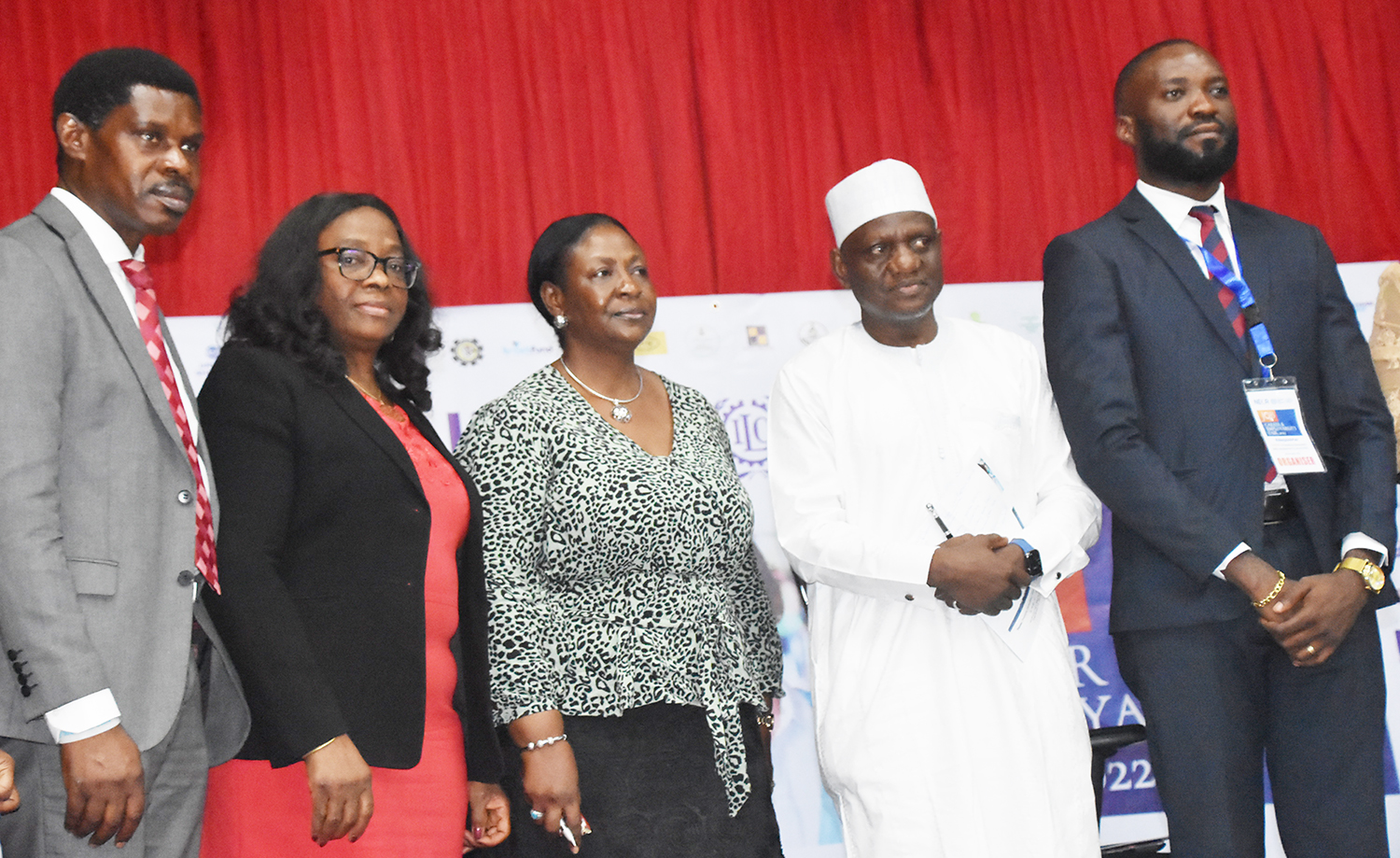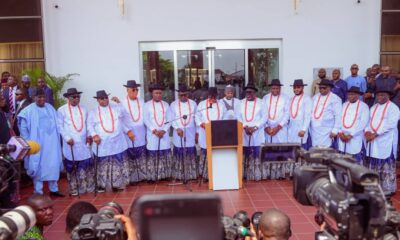News
Clerics Occupy Kaduna Roads, Protest Killings …Ask FG To Bomb Terrorists’ Enclaves

Clerics unhappy with the deteriorating security situation occupied Kaduna streets, yesterday, and protested over the attacks, killings and abductions by terrorists in the state.
The men of God who staged the protest under the umbrella of Interfaith Alliance called on the Federal Government to step up actions against the terrorists.
They said the killers have over the years, launched attacks on various parts of the state.
“Although the government is doing its best, the best wasn’t good enough. It is now time for the central government to bomb the bandits out of existence,” they said.
Convener of the Interfaith Alliance, Reverend Emmanuel Adebayo, while talking to journalists, appealed to the Federal Government to compensate all the victims of bandits attacks, award scholarships to children affected by banditry and rebuild communities ravaged by attacks.
“Doing so would ameliorate the sufferings of the victims so as to make them overcome the psychological trauma they passed through during the attacks,” he said.
With the hashtag: #Kadunaprays#, Adebayo said the government should be more proactive in whatever actions are being taken against the terrorists.
“The essence of our gathering today is to put together what we refer to as ‘Kaduna prayers’, a prayer work against insecurity. I am sure everybody knows that Kaduna is one of the states plagued by incidences of banditry and terrorism and various forms of criminality and of late, it has been on the increase.
“We believe that the government is doing their best but their best was not good enough. That’s why we have come out to seek divine intervention concerning the issue of peace and security in Kaduna state and Nigeria at large.
“Obviously we are not satisfied with the way the government is going about insecurity at the federal level. However, we want to actually acknowledge the little efforts that have been made but we believe that more can still be done. The government needs to be pre-emptive.
“The government needs to be more proactive. We have been hearing about the cry of our governor; he said he has been taking the reports to those concerned; he said they know where they are and that they listen to their telephone conversation but the response from the security agencies is not good enough.
“So, we are praying that God should touch their hearts to put in more efforts and to be more responsive so that this issue of insecurity won’t be more reactionary but be preventive and we pray that God will give them more wisdom on how to go about it in Jesus name.
“Some of the statements that the Kaduna state government has made such as bombing the forest, sure it’s a welcome development but what we expect is that the government should carry out precautionary attacks.
“When you said carpet bombs, they can hide among innocent people. So if you carpet bomb them, innocent people will die. So, we believe that the government monitor their movement through intelligence and carries out the bombing.”
News
Fubara Attends PDPGF Meeting In Asaba …..Back Court Verdict On National Secretary Position

Rivers State Governor, Sir Siminalayi Fubara, last Friday, attended the Peoples Democratic Party Governors’ Forum (PDP-GF) meeting in Asaba, the Delta State capital.
The Rivers State Governor, who is the Vice Chairman of the PDP Governors’ Forum, attended the meeting, alongside 10 other Governors of the party’s controlled states across the six geopolitical zones of the country.
The first PDPGF meeting in 2025, was held at the Government House in Asaba, at the end of which a seven-point resolution was reached.
Reading the communique at the end of the meeting, the Chairman of the Forum, and Governor of Bauchi State, Senator Bala Mohammed urged the National Working Committee (NWC) to put every machinery in place to ensure a hitch-free NEC meeting on March 13, 2025.
The communique stated:
“The Forum, having examined all the notices required by law to be given to validly convoke NEC, advised NWC to reschedule NEC to the thirteenth (13Th) of March 2025.”
The Forum further noted the Court of Appeal judgment affirming Udeh Okoye as the National Secretary of the party, saying that as a party that believes in the rule of law, it will respect the position of the Appellate Court on the matter.
“The Forum noted with delight the ongoing efforts at resolving the crisis in the National Working Committee, NWC, on the position of the National Secretary, and has reaffirmed its support for the Court of Appeal judgment; consequently, the Forum advised the NWC to set up the machinery for the effective implementation of the court judgment.
“While commending the country’s valiant and patriotic Armed Forces and Security Agencies for maintaining the frontline in securing the country and the gains of our gallant personnel against bandits in parts of the country, the Forum viewed with deep concern, the resurgence of brazen non-state actors. It, therefore, calls for the strengthening of the nation’s security architecture.”
Governors in attendance include: H.E Senator Bala Abdulkadir Mohammed (Bauchi State); H.E Sir Siminalayi Fubara (Rivers State) – Vice Chairman; H.E Rt. Hon. Sheriff Oborevwori (Delta State) – Host; H.E Dr. Agbu Kefas (Taraba State); H.E Rt. Hon. Ahmadu Umaru Fintiri (Adamawa State); and H.E Dr. Dauda Lawal (Zamfara State).
Others are H.E Senator Ademola Adeleke (Osun State); H.E Senator Douye Diri (Bayelsa State); H.E Pastor Umo Eno Ph.D (Akwa Ibom State); H.E Dr. Peter Mbah (Enugu State); H.E Barr. Caleb Mutfwang (Plateau State);
and H.E Bayo Lawal (Deputy Governor, Oyo State), who represented Governor Seyi Makinde.
News
NGO Implants Free Pacemakers Into 22 Cardiac Patients In PH
A United States based Non Governmental Organisation, Cardiovascular Education Forum, in collaboration with the University of Port Harcourt Teaching Hospital (UPTH), has successfully implanted free pacemakers into 22 patients with different cardiac cases in Port Harcourt.
This is in a bid to save lives and encourage patients with low heartbeats to live longer.
The implantable device, which costs $20,000 each, was inserted free of charge on the selected patients.
Speaking during a Special Hospital Ground Rounds at the UPTH with its Theme, “Recent Advances in Cardiac Pacing,” a cardiac Physiologist, Dr Neil Grub, said the NGO was in Nigeria to improve training and learning on cardiac issues and help patients with cardiac problems.
Accompanied by a team of experts comprising a cardiologist and cardiac device implanter, Dr Jagdeep Siagh, and UPTH interventional cardiologist, Dr Edafe Emmanuel, Dr Grubb said pacemakers were inserted on patients with low heartbeats to boost their heart rates.
Earlier, the Chief Medical Director, UPTH, Prof Henry Arinze Ugboma, said each of the implantable devices cost over $20,000.
Ugboma, represented by the Chairman, Medical Advisory Committee, UPTH, Prof Datonye Alasia, said the partnership between UPTH and the foreign NGO was to build networks, and improve services in terms of healthcare delivery, training and learning.
According to him, there is now a ray of hope in terms of treatment of patients with cardiovascular cases in the hospital.
He said the UPTH started the collaboration with Cardiovascular Education Forum in 2018 to boost health, training and learning on cardiac health.
He assured that, “in coming years, the scale of our collaboration with the mission will be higher.”
Chinedu Wosu
News
FG Unveils National Broadband Alliance To Drive Internet Access
The Federal Government has unveiled the National Broadband Alliance, a new initiative aimed at transforming the nation’s digital infrastructure and boosting connectivity across the country.
The initiative was unveiled yesterday in Lagos by the Minister of Communications, Innovation, and Digital Economy, Bosun Tijani, who was represented by the Executive Vice Chairman of the Nigerian Communications Commission, Aminu Maida.
In his address, Tijani stated that NBAN would significantly enhance broadband penetration, which has grown from just six per cent in 2015 to approximately 42 per cent as of October 2024.
To support this agenda, he said the government was leveraging a Special Purpose Vehicle to deploy 90,000 km of fibre backbone across the nation, connecting underserved and rural communities to high-speed internet.
According to him, the initiative aligns with the Renewed Hope Agenda of President Bola Ahmed Tinubu, which prioritises innovation, technology, and collaboration as key drivers of national prosperity.
Tijani stated that the expansion would not only improve access to reliable broadband but also empower Nigerians, particularly in rural areas.
“While the progress made in broadband penetration is commendable, we recognise that much more needs to be done to ensure every Nigerian can enjoy the benefits of reliable, high-speed internet,” Tijani said.
The minister also emphasised the importance of strategic partnerships with donors, investors, and other key stakeholders in achieving the goals set out in the National Broadband Plan (2020–2025).
He said these collaborations would be essential in overcoming infrastructure development challenges and making broadband affordable and accessible for all Nigerians.
“These targets reflect our unwavering commitment to ensuring that broadband is accessible, affordable, and inclusive for all Nigerians. However, we are also aware of the challenges ahead,” he added.
Tijani stressed that achieving the government’s targets—70 per cent broadband penetration by 2025, a minimum internet speed of 25 Mbps in urban areas, and broadband access for 80 per cent of the population by 2027—will require sustained efforts.
“Achieving these goals will require more than just the efforts of the private sector. It will require a holistic approach that includes strategic partnerships with donors, investors, and other key stakeholders in accelerating the rollout of critical infrastructure,” he said.
-
Rivers1 hour ago
Dance Organisation Set To Hold Competition In PH
-
Business46 mins ago
Ekpo Urges For Domestic, Export Market Boost In Gas Supply
-
News5 hours ago
NIS Begins Contactless Passport Application In Europe, Friday
-
Politics32 mins ago
Grassroots Governance: Otu Signs Cross River Local Government Amendment Bill Into Law
-

 News1 hour ago
News1 hour agoFubara Attends PDPGF Meeting In Asaba …..Back Court Verdict On National Secretary Position
-
Business45 mins ago
REA, RESCOs Sign Agreement To Establish 23 Mini-grids
-
News4 hours ago
Telecom Operators Dismiss Talks With NLC On Tariff Hike
-
Politics31 mins ago
How Akande Lied Against Me Over Bola Ige’s Case – Ladoja

